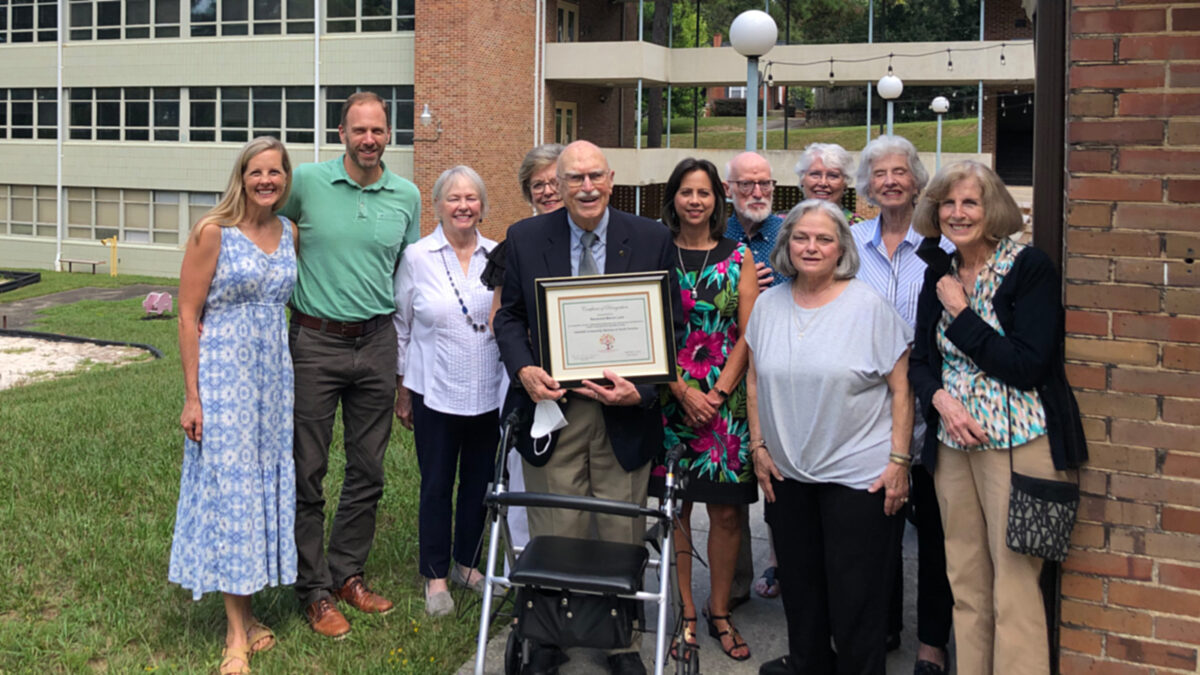
Interfaith Community Services honors longtime service of Marvin Lare
COLUMBIA—Interfaith Community Services of South Carolina Inc., one of the Advance Special Ministries of the South Carolina Conference of The United Methodist Church, honored the Rev. Marvin Lare with a special certificate of recognition Sept. 7.
In addition to his work as a UMC pastor and as founding executive director of Interfaith Community Services, Lare has a long history of social activism nationally and in South Carolina.
Beth Barry, Board-Staff Liaison and Midlands Area Coordinator for Interfaith Community Services, began the recognition by sharing the mission and vision of the organization. Interfaith’s mission is to be a united faith community improving the quality of life in South Carolina by working together to build strong families and healthy thriving children. Their vision is to convene, educate and coordinate faith and other community partners to build strong families and strong communities.
Members from six downtown Columbia churches began meeting in 1967 in the offices of the Methodist Advocate and drafted a proposal in January 1969 to establish an ecumenical Columbia Urban Service Center to “offer a diversified program of building neighborhood centered social welfare and related services to the center city of Columbia.”
The Oliver Gospel Mission became the center of the new organization’s operations.
Barry noted that Lare served as Interfaith’s director for approximately 17 years, starting in 1969. He came to Interfaith after already having a notable history as a civil rights champion and social activist, including participation in planning and strategy sessions with Dr. Martin Luther King Jr. and others in Selma, Alabama, as they prepared for the voting rights march to Montgomery.
After arriving in South Carolina, Lare quickly became a leader working for racial equality and social justice on both local and state levels. He has written several volumes of “Champions of Civil and Human Rights in South Carolina.” With his vision and leadership, Barry shared, the organization set priority action efforts with local churches initially identifying their highest priorities as drug abuse, school integration, aging services and the needs of the homeless. From 1971-1978, they operated a drug response program with a crisis telephone hotline and walk-in center. Treatment services were developed, including a halfway house and a methadone maintenance clinic operated with the Richland County Health Department. Eventually the drug response operation merged with the alcohol treatment programs to form the current Lexington-Richland Alcohol and Drug Abuse Council.
Other major programs included the creation of Meals on Wheels from 1975-1977 when it was transferred to the Midlands Council on Aging; the Summer Food Service Program, a federally funded, state-administered program that reimburses providers who serve free, nutritious meals and snacks to children and teens in low-income areas when school is not in session; the founding of the Cooperative Ministry with First Presbyterian, Main Street United Methodist, Trinity Episcopal, Washington Street United Methodist and First Baptist churches to establish a collaborative method of assisting those in need while preventing the duplication of services; helping to found the first hospice in the state at what is now Prisma Health Richland; and helping the Child and Adult Care Food Programs.
Barry shared that in 1986, Lare resigned to become the executive director of the South Carolina Institute on Poverty and Deprivation and Joanne Emerson was hired as Interfaith’s second director. She served for 21 years and was followed by Marga McKee.
Interfaith Community Services is housed at St. Mark UMC, Columbia.